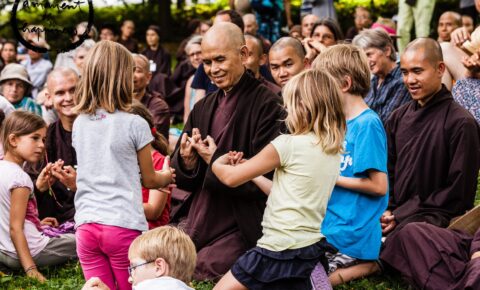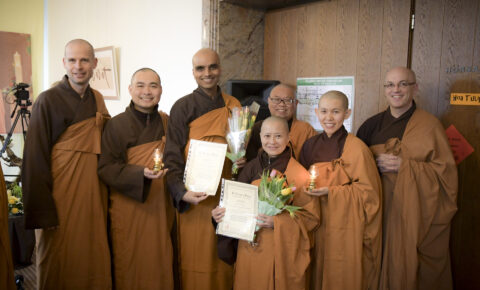As we celebrate the continuation of our beloved teacher, we share with you some heartfelt reflections from our monastic siblings and an introduction to the new album from the Plum Village Band.
Coming and going in freedom
(Sharing from Brother Phap Xa)
There are many simple, yet profound moments I have shared with Thay. I have found it challenging to share these moments with you in written form, as it is not so much what was being said and done, but just the way of being present for the moment.
Walking with Thay one evening in Deer Park Monastery, Thay looked up at the full moon and did not say anything. I felt it was a moment of great freedom. There was just the moment of looking at the moon, as if nothing else mattered. Then Thay said, “The moon is so free. Free of projects and worries.” To be able to recognise that, Thay must have been just that: free.
After Thay’s passing, we all got the text “Coming and going in freedom,” I still carry it with me wherever I go. The wonders of life are beyond grasping and letting go. If I have to name one quality I treasure the most about Thay, it is this one—authenticity. I have always seen the oneness of his life and teachings. He was really free to be fully present for the wonders of life. Thay is freedom. Freedom is Thay.
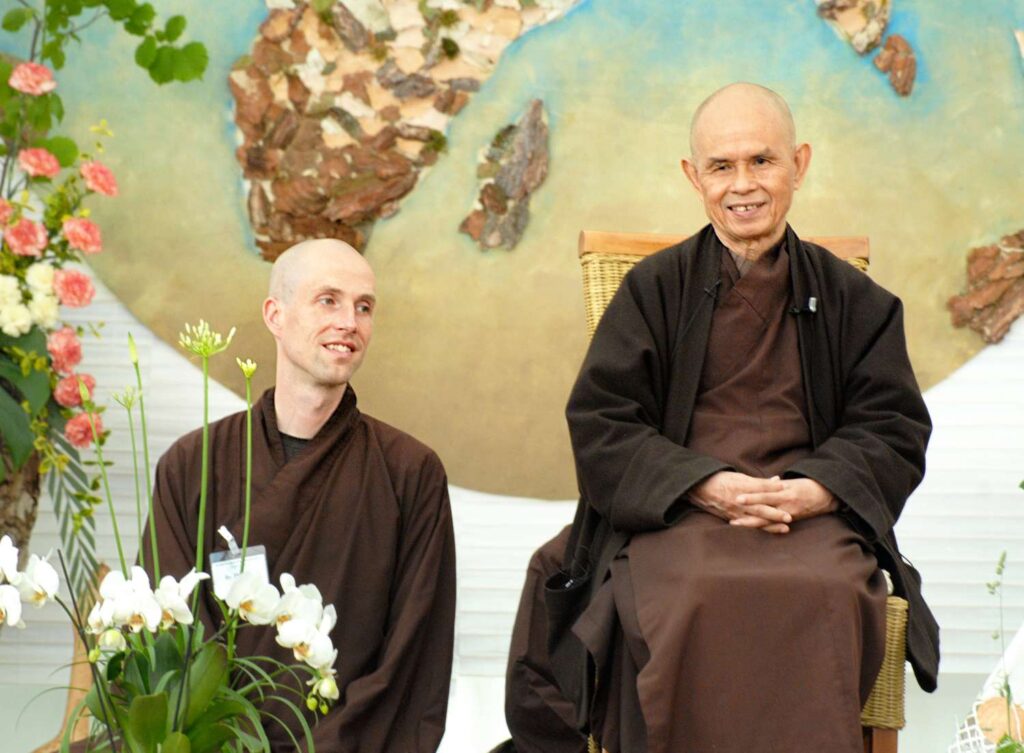
Sing with your own style
(Sharing from Sister Tuyet Nghiem)
While enjoying TET I suddenly heard Thay call out my name, “Tuyet Nghiem, please sing this verse from the Tale of Kieu.” I sat behind Thay, so Thay turned around to look at me as he spoke. I felt confused, because my “level” of singing in Vietnamese folk style was rather low while around me were many elder brothers and sisters who were superb singers. I whispered to Thay for help, “Yes, dear Thay. Just now the elder brothers and sisters sang so wonderfully. Some sang in the Northern style, some in the Central style and some the Southern style. I don’t even know which style I should sing in?” Thay smiled compassionately, “You should sing with your own style.”
Thay’s words startled me. I knew that I could only sing naturally how I have always sung. After singing, though my voice was not very good, I was satisfied with the koan Thay had given me – “You should sing with your own style.” That is the mark of freedom, of ease, of readiness.
Dear respected Thay,
Throughout these past years, I have put all my heart into understanding the practices you have taught me. The mantra “You should sing with your own style” has helped me to overcome feelings of inferiority so that I can be natural and free in whatever I do. Whenever I do something wholeheartedly and with freedom, I can feel Thay right by me.
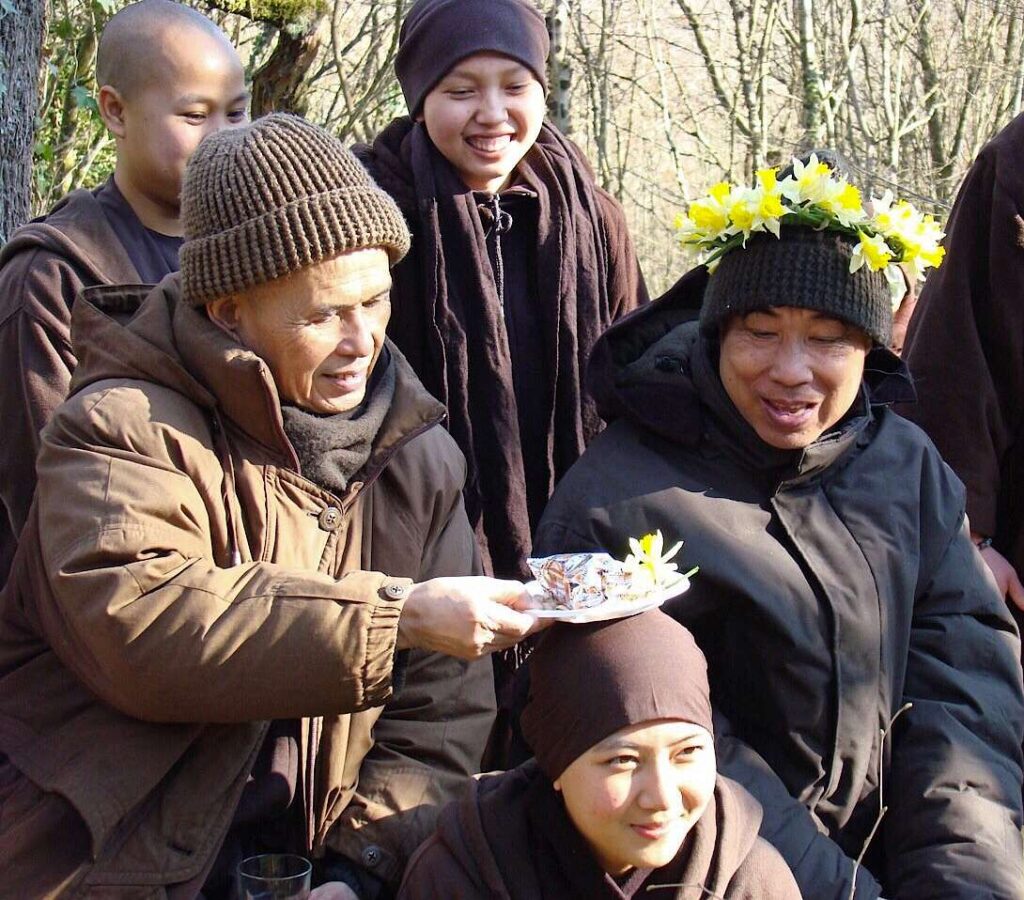
Transcending time and space
(Sharing from Brother Phap Dung)
I first met Thay during a retreat for Vietnamese people in the US. Thay focused on healing intergenerational conflict and trauma as Thay would often do at retreats for Vietnamese people abroad. So many of us had grown up in the West and felt alienated from our parents’ generation. Thay did his best to help us understand and reconcile with each other.
For me, it was the first time I had some understanding of my father’s experience of the war and understanding his anger. I remember going home after the retreat and one day, for some reason, I was very angry with my father. But instead of slamming the door to show my anger — that was how many of us communicated nonverbally in the house — I made the commitment to sit and breathe. I thought, “I will just sit and watch this anger and not say or do anything until it passes.” I did just that. And I sat until the anger subsided. It was a real revelation and triumph for me, to be able to master my anger like that. I know it may seem something small to you, but for me, it was mind-blowing to have sovereignty over my anger. That was the start of my journey of healing my relationship with my father.
Coming to Vietnam this time I am using Thay’s life as an object of my contemplation. To see the environment that Thay lived in, to understand the circumstances he met, and to learn from the decisions he made.
‘’Thay never wanted us to be dogmatic and to have a fixed set of rules to live by. He just wanted us to be mindful and to learn how to respond to each changing situation ourselves.’’
When we learn the life of Thay and of our ancestral teachers, we are bringing history into the present moment. It is not something archaic that only belongs to the past. It is very much influencing our present, and forming our future. It is important to ask ourselves how their lives continue to be relevant in our time.
Thay has helped us learn to dwell in a country of the present moment. One that is without frontiers. Today, as we are surrounded by monastics and lay practitioners from over 30 countries, we really see how the practice of dwelling in the present moment helps us transcend time and space.
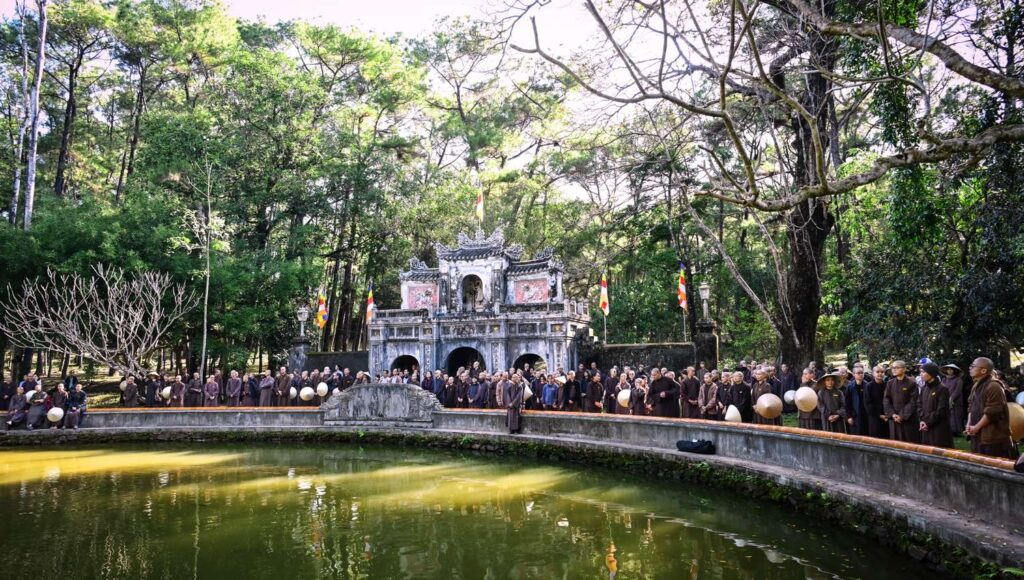
A Cloud Never Dies – Plum Village Band’s Debut Album
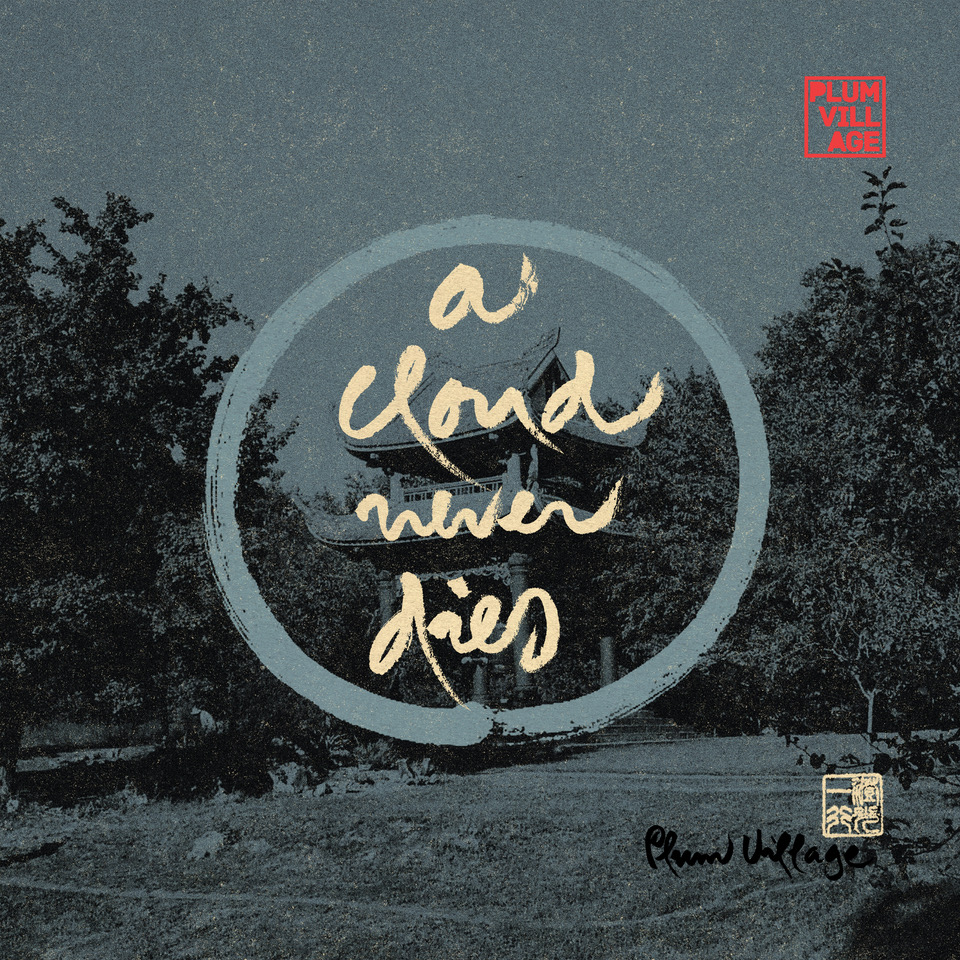
The debut album from the monks and nuns of Plum Village Monastery in France, “A Cloud Never Dies” is a musical meditation, a tribute to a Zen master credited with bringing mindfulness practices to the West, and a deep teaching on the Buddhist principles of “continuation” and “non-fear.”
The album was inspired by and dedicated to the community’s teacher, Vietnamese Buddhist teacher Thich Nhat Hanh. Although he passed away in 2022, Thich Nhat Hanh (or “Thay” – Vietnamese for “teacher”) taught that–like a cloud–nothing ever really dies; it merely transforms. A cloud, for instance, becomes rain, which becomes a river, which becomes the water with which we make the tea we drink, beginning the cycle all over again.
Because death is really a kind of transformation, Thay taught that we can practice “non-fear” about our future and focus more on the present moment.
When we talk about art, it’s not just in the realm of music and painting, but art as an ability to generate joy and happiness in others,
“The essence of the album is to invite listeners on a journey of insight that allows us to get in touch with, and transform, our suffering and grief,” said Brother Phap Huu, abbott of Plum Village Monastery’s Upper Hamlet and a longtime attendant of Thich Nhat Hanh’s. “At the same time, it invites listeners to be in touch with love and inspiration.” Brother Phap Huu, abbot of Upper Hamlet at Plum Village Monastery in France.
Listen here and consider giving whatever you can to support Thay’s continuation through words, music, mindfulness and practices long into the future.



